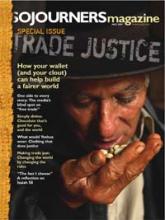The Scottish district of East Renfrewshire has—along with towns, villages, schools, and more than 1,000 churches throughout Britain—recently secured "fair trade status." Ken Macintosh, the district's member of the Scottish Parliament, writes, "It took some doing. We've been meeting regularly for the best part of three years, and for every new business that we signed up, one seemed to slip away again." But the effort was worth it. "Momentum is really going our way on fair trade awareness—on ethical consumerism generally. Fair trade allows each of us to use our power as consumers to challenge inequality. Producers get a fair return on a fair day's work. Not a handout, but respect; not exploitation, but genuine trade. It's good for the developing world, but it's good for us as a society too."
For municipal bodies, fair trade status begins with local government passing resolutions to support trade justice and committing to using fair trade goods in all meetings and facilities. A local steering committee is convened to ensure ongoing promotion of fair trade products and advocacy in the community. Authorities must document that a certain percentage of local businesses are committed to selling and using fairly traded products and set targets for growth in this area. The Fairtrade Foundation certifies when the standards have been met.
Now Scotland and Wales have gone the extra espresso and declared themselves "fair trade nations," pursuing similar measures and goals within government departments and nationwide. The Scottish Parliament is encouraging faith groups, trade unions, schools, and voluntary organizations to sign fair trade pledges and go through fair trade certification.
Read the Full Article

